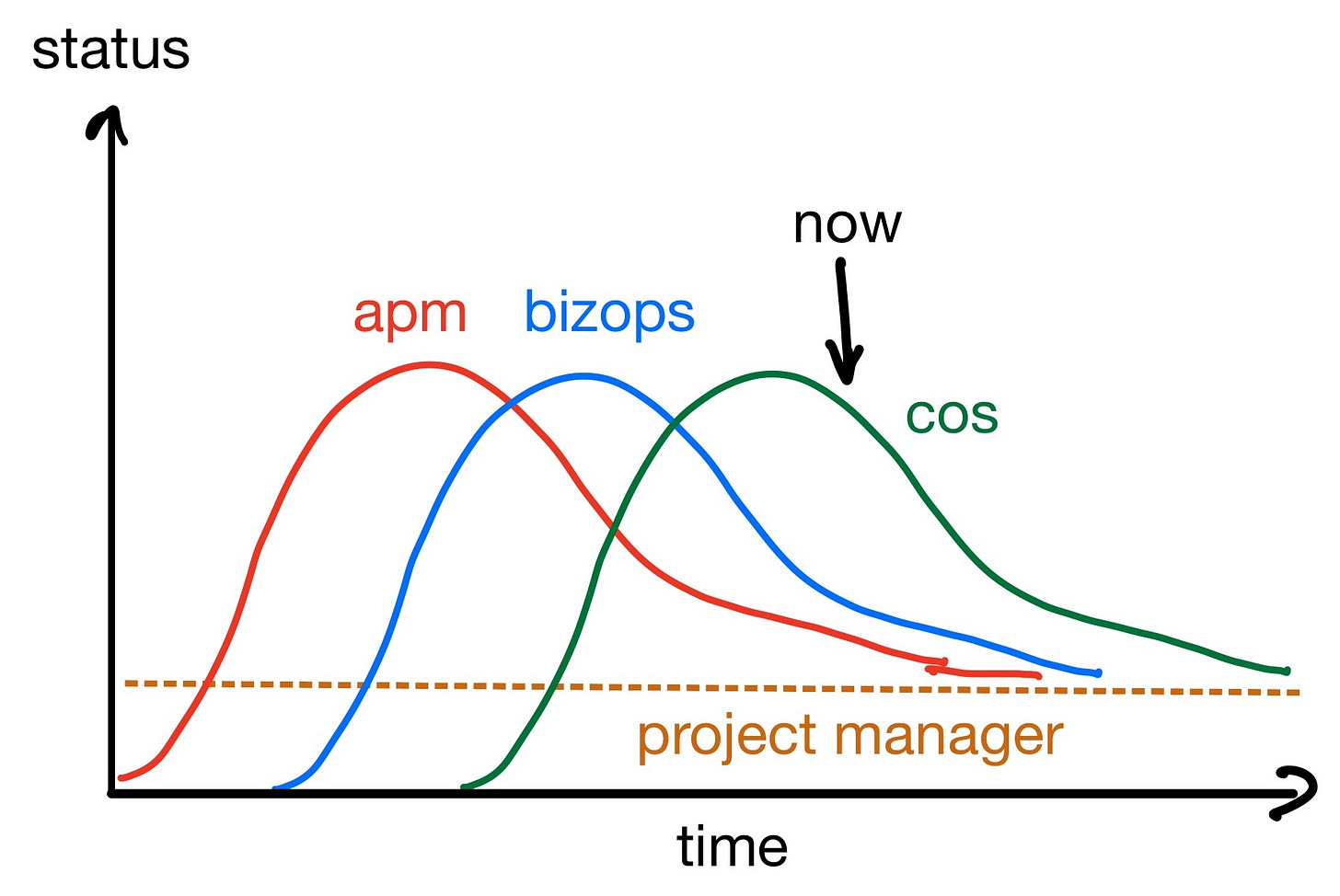The Job Status Cycle
What has been will be again, what has been done will be done again; there is nothing new under the sun.
If you work in tech, you may have noticed a confusing process where, every few years, there’s a new type of person whose title/JD has some permutation of “product”, “associate”, “general”, “strategy”, “business”, “operations”, “finance”, “manager”, and the symbol “&”.
Their role is to “lead key business priorities”, “unlock new growth”, “drive alignment on strategy”, “help the organization scale”, “launch new markets”, and possibly “make sure the smoothies arrive on time”. They describe themselves as “special forces” and “general-purpose athletes”, though they’ve likely never touched a gun and generally aren’t very athletic.
What gives? Why does the title keep changing? Because of the Status Cycle.
The Status Cycle

The cycle creates a new cross-functional role, which has a status/comp arbitrage. As the new role gets increasing visibility, adoption and status, the arbitrage goes away and another New Title must be created.
Phase 1: New Title
Pioneering executives have trouble recruiting talented young people, often because their comp bands aren’t competitive. Unwilling or unable to pay more, they promise things like “high visibility”, “high autonomy”, and “opportunity for growth”, along with a New Title. This is mostly done by rebranding old roles, or by porting them from other industries (see: CoS and politics).
Ambitious youngsters see that it’ll take 2+ years to get promoted because their current manager isn’t making Director any time soon, and therefore they won’t make Senior Manager. Or they don’t want to be management consultants anymore. They decide to start climbing a new ladder.
Phase 2: Manifesto
The New Title hype has built enough that a Manifesto arrives, which increases publicity, visibility, media coverage, and solidifies the definition of the role. At this point, there’s usually a small community, and there’s a pipeline developing from the SF/Silicon Valley offices of MBB and elite investment banks. Most hot companies have 1-2 people with New Title.
Examples:
2015: Why Bizops is the Hottest Team In Tech
2019: The Chief of Staff Role in Silicon Valley, Hail to the Chief of Staff
Phase 3: Harvest
Competition intensifies as New Title attracts more and more interest. Momentum from the high status of the earlier phases begins to be overwhelmed by declining exclusivity. Hiring managers and recruiters have caught on and start repainting old job descriptions.
At this point, there may be a big enough community for a conference. The first few cohorts have usually aged out into management roles. There are entire teams of people with New Title. Fresh MBAs usually show up around this stage.
Phase 4: Decline to Steady State
We are currently entering this phase for Chief of Staff.
Interest in the role slowly declines. The role is no longer unique, and uncool companies have started to use the title. Status begins to trend toward Project Manager, which is a large part of what all these roles do.
At this point, it becomes necessary to add qualifiers, because there is again a need to define hierarchy between roles. For example:
Chief of Staff to the CEO (reports at exec level)
Chief of Staff, VP Operations (sparkling bizops)
Marketing Chief of Staff - Western Division (?????)
Note: there are amazing project managers out there who do a lot of the same work, for a lot less money, because they went to a non-target university when they were 18.
The Aggregate Cycle

I suspect this process applies for jobs like Analytics -> Data Science, but don’t have enough personal experience to be sure.
As we play through multiple cycles, what results is a mishmash of different titles that do variations on the same job. Even if CompanyA and CompanyB generally pay the same, you might be better off being an L5 Chief of Staff, VP Operations at CompanyB than an L5 BizOps Manager at CompanyA. You also don’t know which team actually makes decisions, has exec sponsorship, or gets the interesting projects.
Overall, though, the process is probably net good - some illegibility and new opportunities create room for people to grow outside of existing hierarchies.
No need to worry about it too much. No matter how successful you are, your mom will still wish you went to med school.
Related reading:
Status as a Service by Eugene Wei
Geeks, MOPs, and sociopaths in subculture evolution by David Chapman



Great blog as always! The style is hugely engaging, and I am alwyas excited to read your work when it hits my inbox